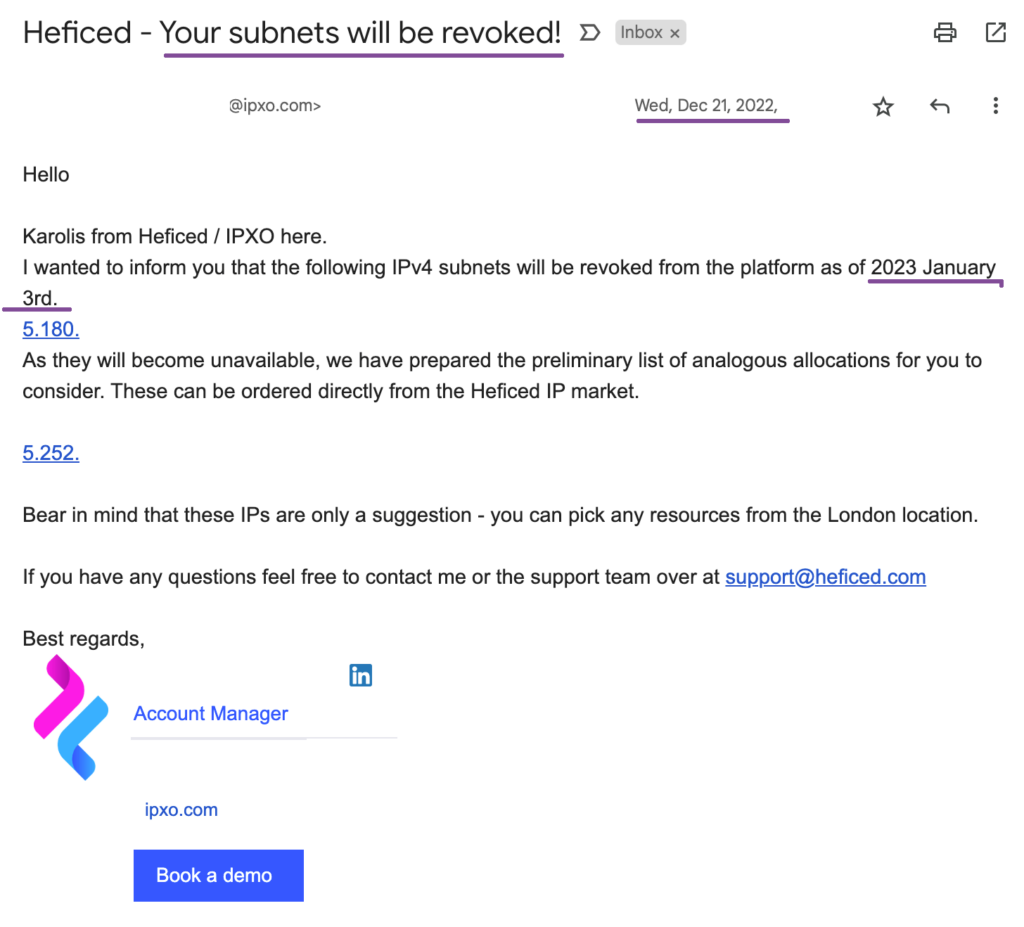Introduction
The growing interest in our project, IPv4DAO, has sparked numerous questions, especially from industry leaders like Vincentas Grineus, CEO of IPXO. As a top marketplace in the IPv4 world, IPXO has had several successful years in the field. In this blog post, we’ll address Vincentas’ question on better governance and compare IPXO and IPv4DAO to provide a clearer understanding of the differences between the two.
1) Centralized vs Decentralized
IPv4 addresses are essential resources for any internet project, and IPXO manages them using a centralized approach. This method has its drawbacks, such as being susceptible to the Principal-Agent problem.
For example, imagine if the CEO of IPXO, who controls a significant portion of the IP exchange market, impulsively decided to ban certain projects from accessing the company’s pool.
And by the way, IPXO does not want to have clients like you. Thanks for spreading the word! 🙌
— Vincentas Grinius (@VGrinius) March 24, 2023
This decision could be made without validation from the team or investors and may not align with broader internet development values. In a similar scenario, there’s nothing stopping the CEO from labeling IPv4DAO as a Ponzi scheme and banning it from monetizing its IPs through IPXO, which almost holds a monopoly on IP exchange.
TBH, it smells like yet another ponzi scheme from many others previously existed. However, I am not saying it is.
— Vincentas Grinius (@VGrinius) March 24, 2023
On the other hand, a decentralized collective prevents principal agents from abusing their governance power by distributing decision-making rights among multiple individuals. DAOs address this issue by granting voting power to token holders, who determine the organization’s best course of action. No single person or group can unilaterally make and enforce decisions. Furthermore, all activities and votes within a DAO are visible on a blockchain, ensuring public and transparent transactions.
2) Resource Neutrality
IPv4 resource neutrality is another important consideration. As a centralized entity, IPXO focuses on maximizing shareholder profits, which dictates its resource allocation decisions. This approach can make IPXO’s pool inaccessible to many initiatives.
In contrast, IPv4DAO bases its decisions on input from a diverse community with varying goals, such as profit-seeking, supporting a decentralized internet, combating censorship, or assisting innovative projects in need of IPv4 resources. By valuing each perspective, IPv4DAO aims to utilize its pool in a more inclusive and equitable manner.

3) Obscurity vs Transparency
IPXO shares useful statistics on pool utilization, but vital information about company operations remains restricted to a select few.
On the other hand, IPv4DAO emphasizes maximum transparency. Our treasury is open to the public, and all discussions take place on Discord and Forum. You can even watch our meeting recordings if you’re into that! Additionally, all our decisions are documented and recorded on the blockchain, ensuring complete transparency.
4) Rules Immutability
IPXO can change their rental rules whenever it suits them. In fact, they already sent subnet “eviction” notices on 21st December ’22, requesting clients to move the subnets by 3rd January – any engineer’s nightmare.

In contrast, IPv4DAO records its rules on the blockchain and executes them through public and immutable smart contracts, providing peace of mind to everyone involved.
5) Closed Source vs Open Source
IPXO’s codebase remains hidden behind corporate barriers, while IPv4DAO embraces an open-source philosophy. We believe in sharing our code with the community and other projects to encourage collaboration and innovation. For instance, we are currently developing an IP subnet escrow smart contract that leverages Chainlink’s decentralized oracle network, allowing everyone to process IP subnet transfers using cryptocurrency.
6) For-profit vs Non-profit
Although IPXO claims to combat IP scarcity, the primary goal of any investor-backed for-profit LLC is to generate profits.
In contrast, IPv4DAO focuses on expanding its pool and creating a better governance model. This doesn’t mean we can’t generate revenue from the subnets we manage. Instead, we reinvest those profits to grow our pool, compensate contributors, and support other valuable initiatives.
7) Closed Gated System vs Open Standards
IPXO’s IPv4 pool is tied to their platform, which means that while you can use and route subnets almost anywhere, you must adhere to the IPXO platform and its fixed 15% fee.
On the other hand, IPv4DAO seeks to tokenize subnets using open standards, making them compatible with various marketplaces and accessible to anyone with a private key. Our goal is to create peer-to-peer solutions with decentralized controls and well-defined rules.
In conclusion, the comparison between IPXO and IPv4DAO highlights the fundamental differences between centralized and decentralized systems. IPv4 addresses are a crucial resource for any internet-based project, and their management can significantly impact the outcome. While IPXO follows a centralized approach, IPv4DAO is decentralized, governed by community participation and consensus. IPv4DAO’s core values prioritize resource neutrality, transparency, immutability of rules, open-source code, and open standards to create a peer-to-peer, decentralized, and trustworthy ecosystem. Overall, the IPv4DAO approach ensures the fair and efficient management of IPv4 resources for the benefit of the community.


